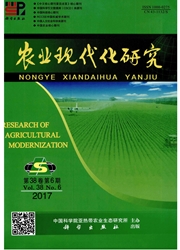

 中文摘要:
中文摘要:
农产品质量安全是关系到消费者健康、三农发展、社会和谐和政治稳定的重大问题,是一项涵盖农产品生产、加工、储运、批发和零售各环节的复杂系统工程,亟须从供应链视角探寻管理措施。农产品供应链核心企业是质量安全管理的关键主体,以提高农产品供应链产业化程度、标准化程度、市场化程度和信息化程度为目标,在实践中形成了农产品供应链核心企业源头控制型、加工控制型、流通控制型、终端控制型和营销控制型等质量安全管理模式。农产品供应链核心企业既要加强内部控制,又要加强与农产品供应链上下游企业的协同,同时应注重法律、媒体和市场等农产品供应链环境因素。农产品供应链核心企业应立足各地区农业产业化进程、农业科技进步和消费需求变化等实际,进行角色选择和职能定位,选择内部控制、外部协同和环境调适等质量安全管理路径,发挥主导作用实现农产品供应链质量安全管理的整体最优。
 英文摘要:
英文摘要:
Agricultural products quality safety management is the key to consumer health, agricultural and rural development, social harmony and political stability, and it is a complex system engineering involving various aspects such as agricultural production, processing, storage, transportation, wholesale and retail. It is necessary to develop countermeasures from the perspective of supply chain. The core enterprises of agricultural supply chain is the important subject of quality safety management. There are multidimensional modes of quality safety management including manufacturing-led, processing-led, wholesale-led, retail-led and marketing-led in practice to improve the level of industrialization, standardization, commercialization and information. It is important for the core enterprises of agricultural supply chain to strengthen internal controls, to strengthen collaboration with upstream and downstream enterprises of agricultural supply chain, as well as to focus on the agricultural supply chain environmental factors such as legal, media and market. The core enterprises of agricultural supply chain play a leading role in carrying out the strategies consisting of internal control, external coordination and environmental adaptation according to the regional factors of agricultural industrialization process, agricultural science and technology and changes in consumer demand, thus to achieve the overall optimum of the quality safety management of agricultural supply chain.
 同期刊论文项目
同期刊论文项目
 同项目期刊论文
同项目期刊论文
 期刊信息
期刊信息
